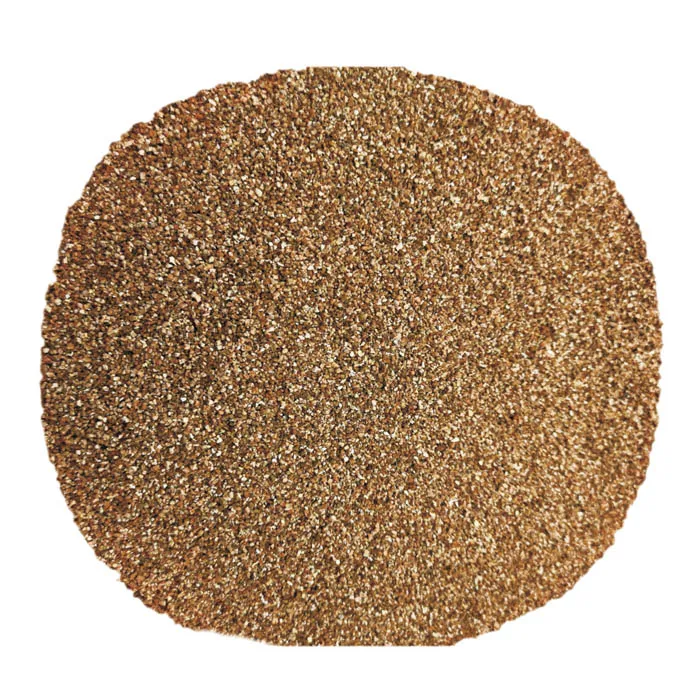Apr . 01, 2025 10:16 Back to list
Using Vermiculite for Seed Starting and Root Development
When it comes to growing healthy plants, using garden vermiculite can make a significant difference. This natural, lightweight material helps improve soil aeration, moisture retention, and root development, making it ideal for potting soil vermiculite, seed starting, and transplanting. Whether you're a home gardener or a commercial grower, adding vermiculite for gardens to your planting mix ensures that your plants grow strong and healthy.

Why Soil Vermiculite is Essential for Seed Starting
Using soil vermiculite in seed-starting mixtures provides a balanced environment for germination. Unlike regular soil, potting soil vermiculite creates the perfect conditions for delicate seedlings to establish strong roots.
Retains Moisture Without Waterlogging
One of the biggest challenges in seed starting is maintaining the right moisture level. Garden vermiculite absorbs water and slowly releases it, ensuring that seeds stay hydrated without becoming waterlogged. This is particularly useful for young plants that require consistent moisture to sprout successfully.
Improves Air Circulation in the Soil
A well-aerated growing medium is essential for healthy seed germination. Soil vermiculite prevents compaction, allowing oxygen to reach the seeds and roots. This improves root development and reduces the risk of damping-off disease, a common fungal issue in seedlings.
Prevents Nutrient Leaching
When watering seedlings, nutrients can wash away from the soil. Potting soil vermiculite helps retain essential nutrients, keeping them available for young plants as they grow. This ensures that seedlings receive the nourishment they need during their early stages of development.
How to Use Garden Vermiculite for Seed Starting
Incorporating vermiculite for gardens into your seed-starting process is simple and effective. Follow these steps to give your seeds the best possible start.
Step 1: Mix with Potting Soil
For the best results, mix soil vermiculite with a high-quality seed-starting mix. A typical ratio is:
- 50% potting soil
- 25% vermiculite
- 25% compost or peat moss
This blend ensures good moisture retention and aeration while providing nutrients for early growth.
Step 2: Sow Seeds and Cover with Vermiculite
After placing your seeds in the prepared soil, sprinkle a thin layer of garden vermiculite on top. This helps regulate moisture, prevents crusting, and protects seedlings from fungal diseases.
Step 3: Water Gently
Use a spray bottle or gentle watering method to keep the potting soil vermiculite mix moist. Avoid overwatering, as vermiculite already retains moisture well.
Step 4: Maintain a Warm, Humid Environment
Place the seed trays in a warm location with indirect light. Covering the trays with plastic wrap or a humidity dome will help retain moisture and speed up germination.
Boosting Root Development with Soil Vermiculite
Once your seedlings have sprouted, strong root development is key to healthy growth. Vermiculite for gardens provides the perfect conditions for root expansion and plant stability.
Encourages Deep Root Growth
Soil vermiculite creates a loose, aerated environment, allowing roots to grow deeper and spread out. This improves nutrient absorption and makes plants more resilient to drought.
Reduces Transplant Shock
When moving young plants to larger containers or outdoor gardens, potting soil vermiculite helps reduce transplant shock. The airy texture allows roots to adapt more easily to new soil conditions.
Ideal for Root Cuttings
For gardeners propagating plants from cuttings, garden vermiculite is an excellent medium. Simply place cuttings in damp vermiculite, and they will develop roots faster than in regular soil.
Choosing the Right Vermiculite for Gardens
Not all vermiculite for gardens is the same. Choosing the right type ensures the best results for your plants.
Fine or Medium Grade for Seed Starting
For starting seeds, opt for fine or medium-grade soil vermiculite. These smaller particles retain moisture efficiently while allowing delicate roots to develop easily.
Coarse Grade for Soil Improvement
If you're improving garden soil for larger plants, use coarse garden vermiculite. It enhances aeration and drainage in dense soils, making it ideal for raised beds and outdoor gardens.
Organic and Chemical-Free Options
Always choose high-quality, chemical-free vermiculite for gardens to ensure the best growth environment for your plants. Look for organic certifications if using vermiculite for edible plants.
Vermiculite for Seed Starting and Root Development FAQs
Can I use 100% vermiculite for seed starting?
Yes, you can start seeds in pure soil vermiculite, but it is best to mix it with potting soil or compost for added nutrients. This ensures strong seedling growth beyond the initial germination stage.
How often should I water plants with vermiculite in the soil?
Garden vermiculite retains moisture well, so you may need to water less frequently than regular soil. Check the moisture level by touching the soil—if it feels damp, hold off on watering.
Does vermiculite improve plant growth?
Yes! Potting soil vermiculite improves moisture retention, aeration, and nutrient absorption, all of which lead to healthier plants and stronger root development.
Can I use vermiculite for hydroponic gardening?
Yes, vermiculite for gardens is commonly used in hydroponic systems. It holds moisture and nutrients while allowing roots to access oxygen, making it a great medium for hydroponic growth.
Is vermiculite better than perlite for seed starting?
Both materials have benefits, but soil vermiculite holds more moisture, making it better for seed starting. Perlite is better for improving drainage in soil mixtures.
Enhance your gardening success with high-quality vermiculite! Order now and give your plants the best growing environment.
-
Strength with Premium Steel and Calcined Bauxite
NewsJul.28,2025
-
Revolutionize Construction Efficiency with Smart Industrial Materials
NewsJul.28,2025
-
Redefined with High-Grade Iron Powder Solutions
NewsJul.28,2025
-
Metallurgical Efficiency with Innovative Recarburisers and Covering Agents
NewsJul.28,2025
-
Industrial Efficiency Enhanced with High-Performance Recarburizer Solutions
NewsJul.28,2025
-
Boosted by Advanced Iron Powder and Carbon Additive Solutions
NewsJul.28,2025
